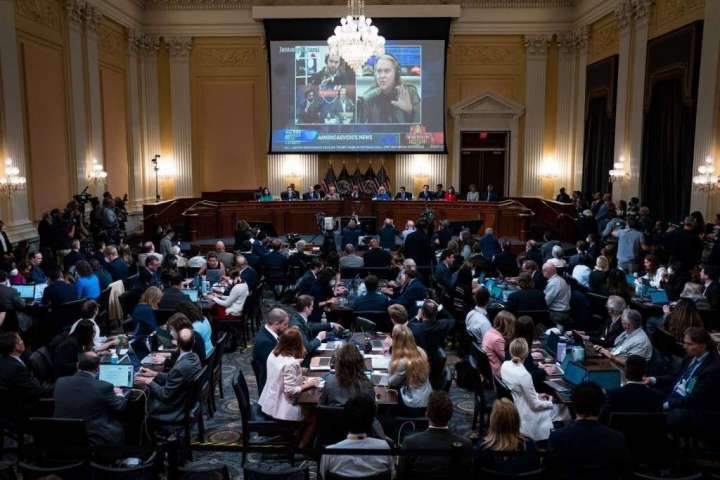Former Trump White House lawyer Eric Herschmann has quickly emerged as the most quotable man in the Jan. 6 committee hearings. And he delivered again in Tuesday’s edition, with the committee playing his characteristically exasperated comments about dealing with Sidney Powell and her bogus voter-fraud conspiracy theories, which were overwhelmingly shut down by judges.
Trump-appointed judges keep ruling against Trump and Co. on Jan. 6

“She says, ‘Well, the judges are corrupt,’ ” Herschmann recalled Powell saying. “And I was like, ‘Every one? Every single case that you’ve done in the country you guys lost? Every one of them was corrupt? Even the ones we appointed?’ I’m being nice. I was much more harsh to her.”
It’s not novel to point out that even Republican- and Trump-appointed judges have almost unanimously ruled against Donald Trump’s side on such things. But Herschmann’s comments crystallize something that should never be overlooked when it comes to evaluating the GOP’s Jan. 6 case. And they were played even as the legal setbacks in the fight against the Jan. 6 committee continued apace this week — courtesy of a Trump-appointed judge, no less.
In a hearing Monday, U.S. District Judge Carl J. Nichols eviscerated most every real defense Stephen K. Bannon could offer for flouting the Jan. 6 committee’s subpoena. He said Bannon couldn’t cite the claim that Trump had invoked executive privilege or the claim that the subpoena was invalid, and that he couldn’t call House Democrats like Speaker Nancy Pelosi (D-Calif.) as witnesses.
That left Bannon with essentially one clear defense: that his misunderstood the subpoena.
“What’s the point in going to trial here if there are no defenses?” Bannon attorney David Schoen lamented afterward.
Nichols became the latest judge to reject arguments that the Jan. 6 committee itself is illegitimate because of its construction and its mandate. He is now the fourth judge to do so and the second Trump appointee, after U.S. District Judge Timothy J. Kelly. Kelly in May issued a significant ruling rebuking multiple arguments from the Republican National Committee as it sought to block the Jan. 6 committee’s access to emails and data.
Kelly reserved particularly harsh words for the RNC’s argument that public comments from members of the Jan. 6 committee indicated the investigation was a political sham. He said the supposed evidence “does not come close to showing that the Select Committee’s proffered legislative purpose is merely a pretext.”
Nichols was more brief in his rejection of a similar argument that Bannon’s team made against the Jan. 6 committee. But the totality of his rulings against Bannon was significant for another reason: In March, Nichols had become the first federal judge to reject the Justice Department’s attempt to use a crucial federal law against Jan. 6 defendants. The former Clarence Thomas clerk dismissed the charge of obstruction of an official proceeding against a defendant; he ruled that the law was significantly narrower than what a dozen other judges had decided, in previously upholding such charges.
Those judges included Trump appointees Kelly, Dabney L. Friedrich and Trevor N. McFadden, along with George W. Bush appointee John Bates, who have all argued for a broader interpretation.
Nichols’s ruling was viewed as a potentially significant one, not just for those defendants but also potentially for Trump, who has been targeted for allegedly violating the same law by Rep. Liz Cheney (R-Wyo.) and the Jan. 6 committee. The Justice Department is appealing the decision.
(Nichols himself late last year asked the Justice Department about whether the law could hypothetically be used against the president, though he didn’t name Trump specifically — a conversation that took on new significance when Cheney invoked the potential charge weeks later.)
Dating back further, Republican- and Trump-appointed judges played a huge role in the overwhelming rejection of Trump’s and his allies’ voter fraud claims.
According to a review by The Washington Post in mid-December 2020 — shortly before the electoral college certified Joe Biden’s win — 38 of 86 judges who rejected at least one post-election lawsuit were Republican appointees.
And they often spoke in blunt terms. One Trump-appointed judge remarked, “Charges require specific allegations and then proof; we have neither here.” Another said that the effort to block the certification of Biden’s win in Georgia had “no basis in fact or in law.” A third called Trump’s effort to allow the Wisconsin legislature to appoint alternate electors “bizarre.”
“A sitting president who did not prevail in his bid for reelection has asked for federal court help in setting aside the popular vote based on disputed issues of election administration, issues he plainly could have raised before the vote occurred,” Judge Brett H. Ludwig wrote.
In addition, judges who declined to bolster Trump’s 2020 election claims included more than 10 percent of the judges who graced Trump’s various shortlists for the Supreme Court. That was punctuated by all three of Trump’s Supreme Court picks, who declined a last-ditch effort to overturn the election results in four states.
In between those post-election cases and the recent Jan. 6-related rulings have been a series of rulings allowing defamation cases against Trump allies to proceed, including ones involving false claims against voting-machine companies. Again, Republican-appointed judges were playing a key role.
And one person in particular noticed that.
“It’s fascinating to me that so far … mainly Trump-appointed judges that have been … ruling that across the board on all these, that these cases go forward,” Bannon remarked in December.
One of those judges was Nichols, who has presided over Dominion’s lawsuit against Powell and fellow Trump allies Rudy Giuliani and Mike Lindell. And Bannon made the comment even after Nichols was assigned to his own case.
This week, Bannon became the latest Trump ally to find himself on the wrong side of one of the “ones we appointed.”






